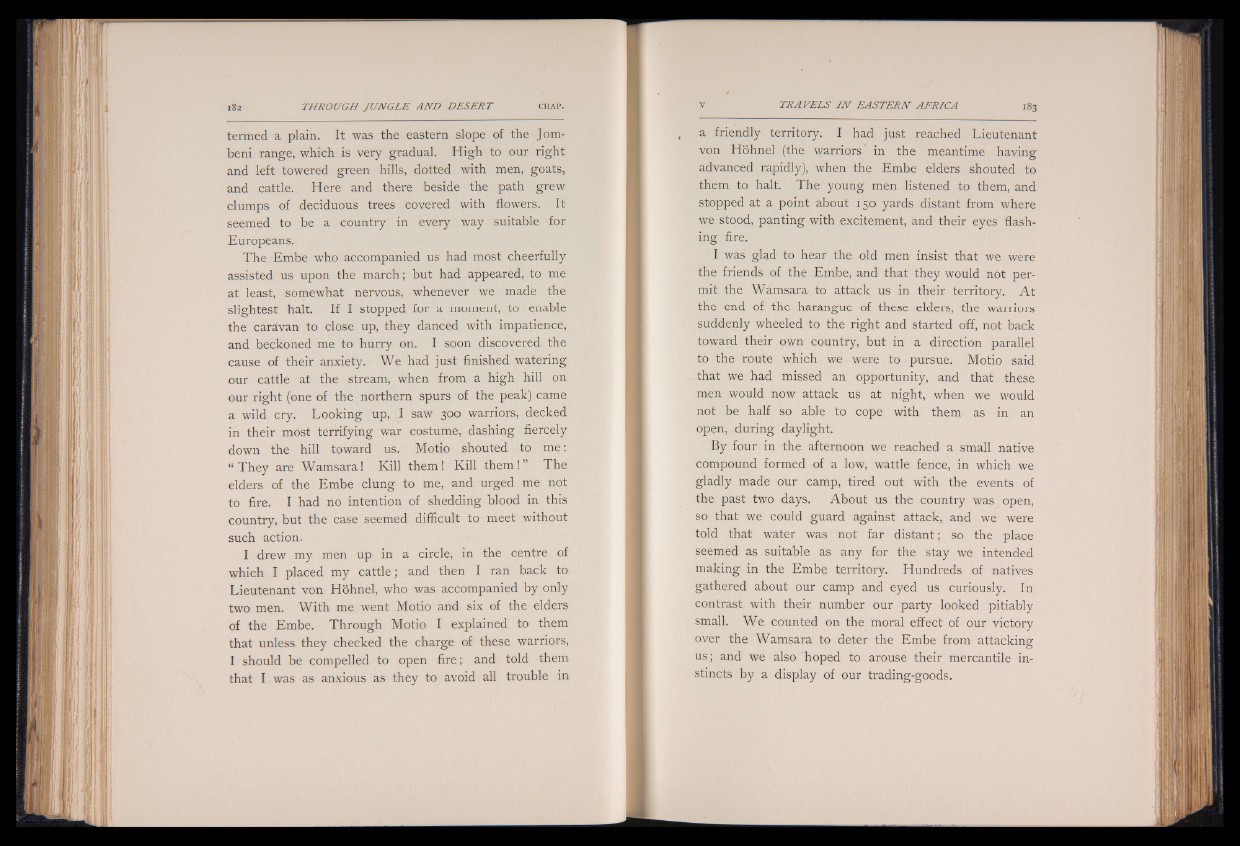
termed a plain. It was the eastern slope of the Jom-
beni range, which is very gradual. High to our right
and left towered green hills, dotted with men, goats,
and cattle. Here and there beside the path grew
clumps of deciduous trees covered with flowers. It
seemed to be a country in every way suitable for
Europeans.
The Embe who accompanied us had most cheerfully
assisted us upon the march; but had appeared, to me
at least, somewhat nervous, whenever we made the
slightest halt. If I stopped for a moment, to enable
the caravan to close up, they danced with impatience,
and beckoned me to hurry on. I soon discovered the
cause of their anxiety. We had just finished watering
our cattle at the stream, when from a high hill on
our right (one of the northern spurs of the peak) came
a wild cry. Looking up, I saw 300 warriors, decked
in their most terrifying war costume, dashing fiercely
down the hill toward us. Motio shouted to me:
“ They are Wamsara! Kill them! Kill them ! ” The
elders of the Embe clung to me, and urged me not
to fire. I had no intention of shedding blood in this
country, but the case seemed difficult to meet without
such action.
I drew my men up in a circle, in the centre of
which I placed my cattle; and then I ran back to
Lieutenant von Hohnel, who was accompanied by only
two men. With me went Motio and six of the elders
of the Embe. Through Motio I explained to them
that unless they checked the charge of these warriors,
I should be compelled to open fire; and told them
that I was as anxious as they to avoid all trouble in
a friendly territory. I had just reached Lieutenant
von Hohnel (the warriors' in the meantime having
advanced rapidly), when the Embe elders shouted to
them to halt. The young men listened to them, and
stopped at a point about 150 yards distant from where
we stood, panting with excitement, and their eyes flashing
fire.
I was gUd to hear the old men insist that we were
the friends of the Embe, and that they would not permit
the Wamsara to attack us in their territory. A t
the end of the harangue of these elders, the warriors
suddenly wheeled to the right and started off, not back
toward their own country, but in a direction parallel
to the route which we were to pursue. Motio said
that we had missed an opportunity, and that these
men would now attack us at night, when we would
not be half so able to cope with them as in an
open, during daylight.
By four in the afternoon we reached a small native
compound formed of a low, wattle fence, in which we
gladly made our camp, tired out with the events of
the past two days. About us the country was open,
so that we could guard against attack, and we were
told that water was not far distant; so the place
seemed as suitable as any for the stay we intended
making in the Embe territory. Hundreds of natives
gathered about our camp and eyed us curiously. In
contrast with their number our party looked pitiably
small. We counted on the moral effect of our victory
over the Wamsara to deter the Embe from attacking
us; and we also hoped to arouse their mercantile instincts
by a display of our trading-goods.